'We may think we understand the sea, but it’s not until you get in it that you realise how volatile an element water is,' says Libby Purves
Libby Purves:
On Christmas day, I shall swim in the North Sea. Or, if it is unconscionably and dangerously rough, get fleetingly soaked through in the first available surf, and hope not to be rolled in the pebbles. It is a custom here, as in many other coastal towns and villages: some have a Christmas morning swim, others favour Boxing Day or New Year’s Day. Or all three. Most are unofficial; the moment you put up signs and get sponsored, there will be health-and-safety rules and bannings. But it is always a pleasing winter scene to watch half a little population hurtling into the waves, shrieking merrily, while the other half stand watching, shaking their heads and holding the towels and thermoses. There’s a certain cachet in taking the midwinter plunge, though actually it’s a bit of a fraud because really it’s the air that’s at its coldest. Our shallow East Coast sea doesn’t cool down too much before the turn of the year. An Easter morning swim would be far braver from that point of view.
But for some, this Christmas event is only part of a year-round devotion to a daily morning dip. Since we moved back here I swim alongside such an informal group whenever I can, though I haven’t yet managed a complete winter (sometime around mid-November I seem to stop and not pick up the habit again). But there have always been dedicated hardy-perennial dippers, ever since I was a child here. A gang of elderly ladies ascribed their longevity to 365 sea immersions a year, each one followed by bacon and eggs and a good slug of Violet’s famously lethal elderflower sherry.
But what, you ask, has this to do with yachting? Patience, Vice-Commodore! There is a point. These daily swimmers have a respectful, interested, and quirkily intimate attitude to the sea, which sailors – especially those of us with arrogantly powerful engines – may not share. I am slowly learning from the veterans’ odd remarks and cautions. Tide tables are of course vital, but quite a blunt instrument. How high the sea rises is affected by high and low pressure. Indeed, we once got neaped scrubbing on a slipway in Dartmouth for not understanding that. Likewise the shape and depth of the trench between our two sandbanks alters remarkably fast. It may be on a smaller scale than the big banks we navigate round on boats, but the sand’s ability to shape-shift has been a lesson in what water and weather can do.
Currents too are not as simple as the diamonds on our charts suggest. When the longshore wind is blowing hard, parallel to the beach, we know there will be a fair old undertow sucking at our feet. But the next day in an early morning calm, it would be rash to expect that the sideways current will have abated. It won’t, not necessarily. Which is why one stays in one’s depth. On a glassy-smooth sunny morning I have found myself swimming briskly on the spot, gripped by a current parallel to the shore for no apparent reason, making some effort just to keep up with my heap of clothes on the beach and not have to trudge back up the cold pebbles. It is as if a wind, long abated above the surface, continues to blow beneath it.
Water is a glorious element: living, vivid, shape-shifting into foam or mounds or whirling eddies or eerie flatness. Salt water, in its great ocean masses, rolls over uneven sea floors and rebounds off shorelines near or far away; fretted by equally uneasy and unreliable winds, it can do almost anything and take any shape, sometimes a whole day after whatever caused the change. Navigating close to any shore we should remember this. What the book says about currents and tidal height may not be the whole truth and nothing but the truth…
Everyone who has sailed for years knows this, but it really comes home to you when you strip off and get in amongst those coastal waves, and find that the sea is different every single day.
Libby Purves November 2016 Podcast
A healthy fear of the sea comes with experience, but new crew remind us why we fell in love with…
Libby Purves September 2016 podcast
I was a really useful bit of kit once. As handy as any new gizmo in the posh chandlery, as…
Libby Purves August 2016 Podcast
It was a particularly vile, early-season shakedown passage to Ostend. We crossed a North Sea which threw up its trademark…
Libby Purves July 2016 Podcast
Good to have the pilotage notes on going round Land’s End (p40). No headland is without its nervous moments, especially…
Libby Purves June 2016 podcast
Years ago when we were young, we went to a few yacht club meets in our Contessa 26, Barnacle Goose.…





